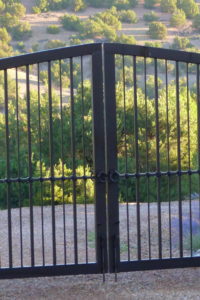 Past the ego’s guarded gate: empowering revelations
Past the ego’s guarded gate: empowering revelations
After my mom’s death in August, I was taken by surprise to realize there were things I was holding against her and myself. Things I had not forgiven. Things that came to me the day after the funeral planning was done, and I was taking my usual morning walk. There, on the street, in the open space of that walk, up they came. I cried my eyes out, stalled between one step and the next. I cried first for myself and things I’d never acknowledged, and then for my mom and that I hadn’t reconciled these feelings while she was alive.
A few weeks later, “the ego’s guarded gate,” a phrase from the third treatise, A Treatise on the Personal Self, sprang into my mind.
What empties space for love for fill?
Each time you have “fallen” in love you have emptied a space for love to fill. Each time you have felt true devotion you have emptied a space for love to fill. You have been emptied of the ego-self as creative moments of inspiration filled you and emptied of the ego-self in moments of connection with God. Conversely, you have been emptied by the lessons of grief as the loss of love has led to a loss of self. You have been emptied by a loss of self due to illness or addiction, depression, or even physical exhaustion. All these things you have brought to yourself for they have been the only way past the ego’s guarded gate. T3:5.2-3
Grief is a space. My morning walk was a space. That I looked up from wiping my tears that day, and looked into the eyes of a young buck deer standing on the edge of our neighborhood park, provided another space. We looked at each other for minutes. Minutes! There was such  gentleness in those minutes! I felt so relieved.
gentleness in those minutes! I felt so relieved.
What was going through my mind, causing my tears was a short-form of what Jesus asks us to do in Chapter 19 of the Course: to review our lives. And how perfect is it that he responds immediately afterwards, in the book and in life, by offering us the embrace of love:
This is a call to move now into my embrace and let yourself be comforted. C:20.2
It is here that he speaks of the loss of the ego for the first time. “You are no longer the “I” of the ego.” We move and move and move…beyond the ego’s guarded gate.
In Learning in the Time of Christ, there’s another call:
a.32 The entrenched patterns of the past are difficult to dislodge even when they have been recognized. Individuals can be encouraged here to “watch the parade go by” as what has gone unhealed is brought forward for acceptance, forgiveness, and letting-go. With the letting-go of each old pattern or situation that seems fraught with peril, a cloud of despair will lift, a little more of darkness recedes, and a little more light is available to show the way.
After a parent’s death, as after the death of the ego, a space opens in which we can take on a new Self. A new authority. My dad died ten years ago. With the death of my mom, my parental “authority” is gone. It seems kind of strange, but it makes a difference. I feel a difference. And how strange that the tenderest, most heart churning moments of our lives can and do bring us a new authority. I felt this too.
[T]here is no authority to whom you can turn. But in place of that “outside” authority, I give you your own authority, an authority you must claim in order for it to be your own.
Become the author of your own life. Live it as you feel called to live it. (D4.23-24)
With each acceptance, each forgiveness, each step past our barriers to love, you and I claim our authority, and become authors of our own lives.
(I used the above quote in an interview recently. You can listen to the interview here:
https://www.voiceamerica.com/episode/103035/connection-and-creativity-the-power-to-be-who-we-are
The topic was “Connection and Creativity.” You can find a copy of my “Call to Power for Women,” on the blog of my interviewer, Sharon Ann Wikoff: http://www.sharonannwikoff.com/VOICE-4-TRUTH.html


I needed that tonight, am near the end of 3ed reading .Each has been different , 1st curious , 2ed joyful , 3ed difficult to say the least. Thanks Sister, I can sleep now, I am not alone.
Stewart
Hi Stewart, I feel as though I know just how you feel–how this Course changes us and changes on us. The giddy beginning and then the deepening. I also appreciate not feeling alone. That’s the great comfort, isn’t it.
Mari, thanks for this blog. Through your openness you create an opening for others to embrace those moments when we are ‘taken by surprise’ by that overwhelming from our depths calling us to the next ‘pass-through’ experience. Enabling us to release one more grief, one more bitterness, one more blindness.
How often does God shine through the eyes of a buck, a cat, a little bird, another human. Bringing comfort. Even a little toad came to me the other day representing far more than its little self!
Hi Paula, I love your expression “taken by surprise.” All of my biggest revelations have come with the feeling of surprise. Paradoxically, they also come with the feeling of knowing that what I’m surprised by resided in me the whole while. I do so appreciate, along with you, when they come gently, and especially through nature. Thank you for sharing your response, the toad, and others of Mother Nature’s kingdom who show us the way.
Hi Chris,
Thank you for responding and your acknowledgment of sharing that feeling of the old “authority” being gone. It’s a lot like in The Dialogues when Jesus tells us to rely on ourselves–on a new “internal” authority. There is a bit of sadness in the shift, and I wonder if this isn’t true of each new freedom. We practice it all our lives, don’t we? First we can cross the street alone, then catch the bus, then we’re off in our own cars and our own lives. And now…on to New lives!
Your writing reminded me of my father’s and then my mother’s passings, and how odd it felt to no longer have that parental “authority” around. Interesting how their passing can help us to accept our own internal authority. Still, I find myself, every once in a while, wanting to call my mother on the phone to talk with her. She is there of course, available to talk with me at anytime I decide to connect with her. Thank you for a very useful article Mari.